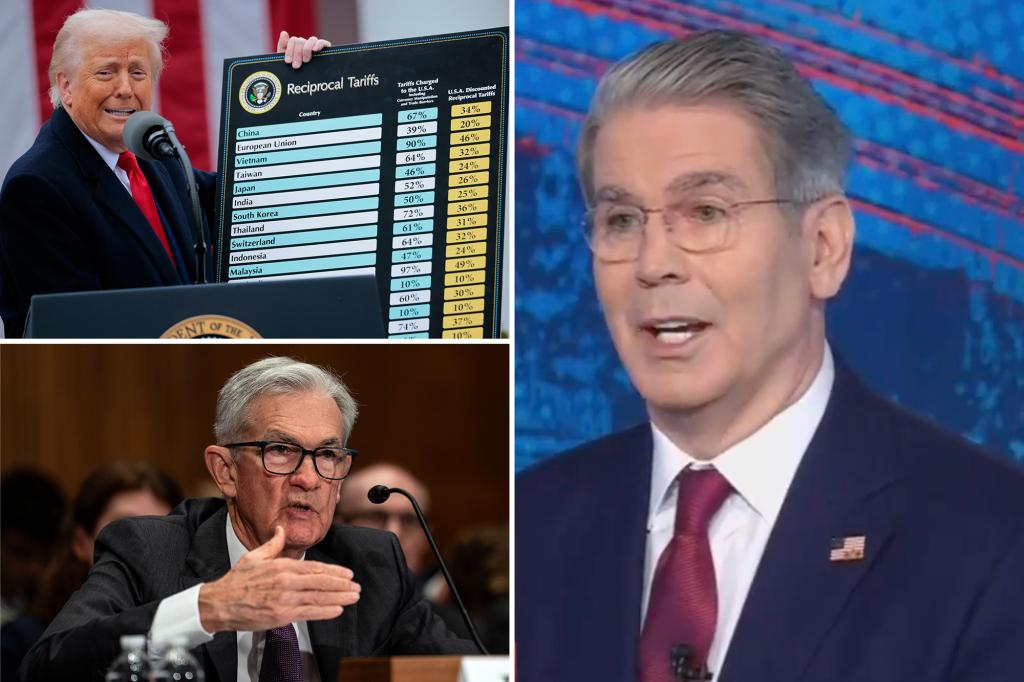Treasury Secretary Scott Bessent revealed that the Trump administration is now eyeing Aug. 1 as the date to slap the “Liberation Day” tariffs against countries that fail to cut lightning deals with the US.
Back in April, Trump had given countries a 90-day extension before slapping those tariffs in place, meaning Tuesday, July 8. However, Bessent explained that Trump will warn countries of the forthcoming tariffs instead of imposing them outright.
“I’m not going to give away the playbook, because we’re going to be very busy over the next 72 hours,” Bessent told CNN’s “State of the Union” on Sunday.
“President Trump’s going to be sending letters to some of our trading partners, saying that if you don’t move things along, then on Aug. 1, you will boomerang back to your April 2 tariff level.”
Trump had previewed his plans to blast out letters to trading partners, but didn’t mention the Aug. 1 deadline. On April 2, which he dubbed “Liberation Day,” Trump unveiled customized tariff rates against virtually every country on the planet — including a 10% baseline rate on almost all imports.
The “Liberation Day” were later paused, though the 10% levy went into effect.
“I think we’re going to see a lot of deals very quickly, and we’re going to send out probably a hundred letters to small countries where we don’t have very much trade, and most of those are already at the baseline 10%,” Bessent added.
So far, Trump has announced various tariff deals with the United Kingdom and Vietnam. The president’s team has also reached something of a tariff truce with China while negotiations play out.
Bessent contended that the Aug. 1 date is “not a new deadline,” and he has previously described a focus on securing deals with 18 of America’s top major trading partners.
“We are saying this is when it’s happening. If you want to speed things up, have at it. If you want to go back to the old rate, that’s your choice,” he added.
“We are close to several deals. As always, there’s a lot of foot-dragging on the other side, and so I would expect to see several big announcements over the next couple of days,” he said.
In addition to handling Trump’s push to revamp US exports and reduce the trade deficit, Bessent has been in the headlines over speculation that the president may tap him to succeed Federal Reserve Chairman Jerome Powell at the central bank.
Bessent has not ruled that out. Powell’s tenure as chair at the Fed ends in May 2026. Trump had first appointed him in 2018.
One of Trump’s chief grievances with Powell has been the Fed’s decision not to lower its benchmark interest rate target — making the $9 trillion in US debt that is expected to come due over the next year that much more expensive to finance.
The rate also increases borrowing costs for homebuyers and businesses.
Powell has defended the Fed’s decision and argued that the central bank is taking a wait-and-see approach to gauge the inflationary impacts of Trump’s tariffs. Historically, the Fed has sought to insulate itself from political influence over monetary policy.
Bessent said that if he was chair of the Fed, he wouldn’t necessarily be able to lower rates overnight.
“I think that the Fed chair does not cut interest rates. It is a committee, so it’s up to the Open Market Committee and the voting members to cut rates,” Bessent said when asked if he would cut rates as Fed boss.
“The President is probably the most economically sophisticated president we’ve had in 100 years, maybe ever,” the Treasury secretary added when asked about Trump’s complaints about the Fed.
Read the full article here


